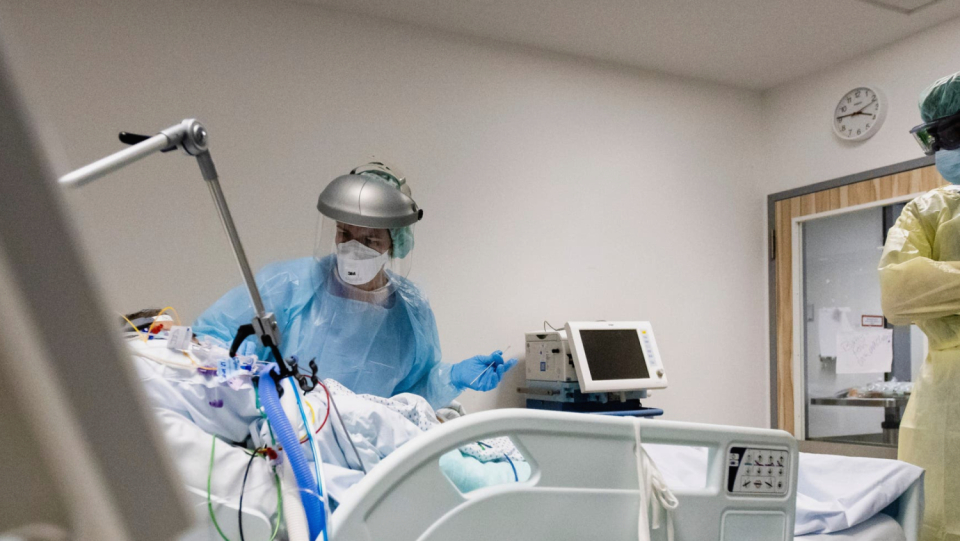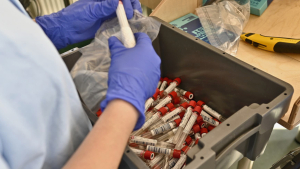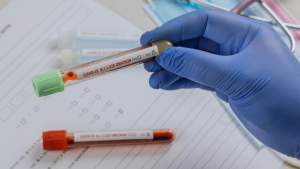Studies indicate that the Coronavirus variant Omikron could make less sick than the Delta variant. However, experts warned on Wednesday not to draw any rapid conclusions: "At the moment, the data on the illness of Omikron seems a little too thin to make generally applicable statements," said the infectious Isabella Eckerle from the University of Geneva.
New studies report rather mild disease courses in Okron infections in South Africa and the United Kingdom. A British research team had already come to similar results in laboratory tests. However, the work has not yet been independently assessed.
The team in South Africa had done a special PCR test to detect omikron, but not a full sequencing, as is customary in Germany. According to the authors, the data from the beginning of October to the end of November showed an approximately 80 percent lower risk of having to go to the hospital for treatment with Omikron infections than with Delta, and an approximately 70 percent lower risk of a severe course. Once the patients were in the clinic, however, they did not differ in the further course.
Eckerle warned of hasty conclusions. "You have to keep in mind that South Africa has a young population, in which previous waves have already been strongly depraved and the reported cases were especially young people with vaccination breakthroughs," she said. "The beta variant also increased in South Africa, so that there is probably another immunological background than ours."
Björn Meyer, head of the virus evolution working groups at the University of Magdeburg, expressed a similar opinion. There are big differences between South Africa and Germany. South Africa has experienced many severe waves, the population is on average much younger. "So it remains to be seen."
Use care when interpreting laboratory results.
The laboratory study from Great Britain worked with so-called pseudoviruses that carry the omikron spike protein on their surface. Compared to the Delta Pseudovirus, the Omikron-Pseudovirus was worse to infect lung cells. The researchers interpret their data in such a way that Omikron partially escapes an existing immune response due to the many mutations in the spike protein, but the virus variant cannot infect and spread cells so well. To what extent the results are transferable to real life is unclear.
One can only extrapolate the data from the laboratory "with a great deal of caution to the actual situation in humans," said Eckerle. The infection in humans is "much more complex".
A third Preprint study, which was only known on Wednesday evening and no longer commented by the experts, also suggests that Omikron rarely leads to hospital admissions. Researchers of the Imperial College in London had compared the data of all Corona cases in England in the first two weeks of December, in which Delta and Omikron could be differentiated. That was several hundred thousand people. According to the estimate, the risk of a hospital stay of at least one day with omikron infections is reduced by about 40 percent compared to delta infections.
However, the researchers at Imperial College pointed out that the effect was partially offset by the higher transmissibility of the Omyron variant. In addition, both in South Africa and in Great Britain, large parts of the population had already been infected with other corona variants by earlier waves and had thus also acquired a certain immunity against Omikron: A past illness reduced the risk of hospitalization in the event of a new infection by almost 70 percent compared to the initial infection.
Moderna and AstraZeneca were also associated with a lower number of hospitalizations among symptomatic cases, but not with BioNTech or Moderna. The researchers warn against hasty conclusions, among other things because of small numbers of cases. In addition, mRNA vaccines would better protect against a symptomatic disease – so that the protection against hospitalization does not differ in the bottom line. Her encouraging conclusion: "Our figures suggest that double-vaccinated people continue to be significantly protected against hospitalization, even if the protection against infection against the Omikron variant has largely disappeared.«
The head of the Robert Koch Institute, Lothar Wieler, continues to exacerbate the Corona situation in Germany. "We can still not assess whether Omikron makes less sick," he said at a press conference on Wednesday. “But even if it were: Omikron is extremely contagious and can escape the immune system more easily. This also leads to infections more often with recovered and twice vaccinated. ”These could also be passed on.
An infection is still possible even after triple vaccination, as the virologist Sandra Ciesek from the University Hospital Frankfurt reported last week in a press briefing. In laboratory experiments, she and her team had demonstrated a greatly reduced response of antibodies to the Omykron variant. "I've seen people who were infected a few weeks after the booster.



















